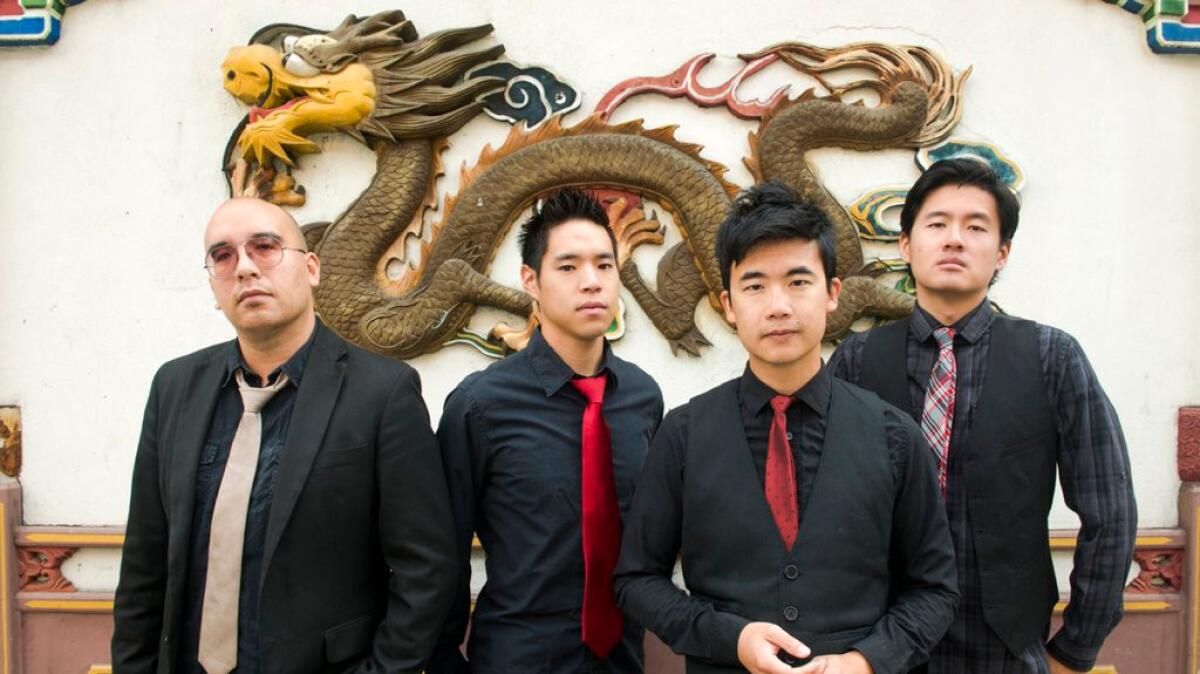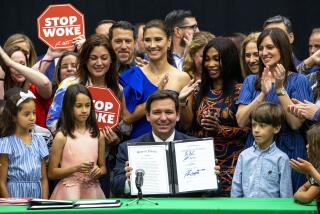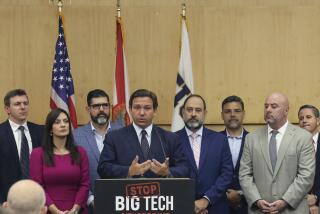Opinion: It’s not the government’s role to say if ‘Slants’ is offensive

You may not have heard of the Slants, an Asian American rock band from Portland, Ore., whose name was chosen as an ironic comment on an ethnic slur.
But the Supreme Court’s announcement Thursday that it will consider a case involving the group’s quest for federal trademark protection is big news.
First, it could affect a far better known (or more notorious) name in entertainment: the Washington Redskins. The NFL team also was denied trademark protection by the U.S. Patent and Trademark Office on the grounds that its name was offensive. The issue in both cases is whether the government may withhold a benefit, such as trademark protection, because it disapproves of the content of speech.
The editorial board of the Los Angeles Times already has weighed in on that issue. In an editorial in November we wrote: “The name ‘Redskins’ is offensive to Native Americans, and we wish that the owners of the National Football League franchise in Washington, D.C., would retire it. But the government’s decision to deprive the name of federal trademark protection went too far, and the team has the 1st Amendment on its side in challenging that decision.”
That’s essentially what a federal appeals court concluded in ruling in favor of the Slants, and the Supreme Court should affirm that ruling. By doing so, it also would dispose of the argument against trademark protection for the Redskins.
But a victory for the Slants could be significant in a second sense. It could give the court an opportunity to control the damage from one of its worst 1st Amendment rulings in recent history.
That was last year’s 5-4 decision in which Justice Clarence Thomas joined the court’s four liberals in upholding a decision by the state of Texas to refuse an application by the Sons of the Confederate Veterans for one of hundreds of specialty license plates the state issued to various associations, colleges, fraternities and businesses. The plate would have featured the organization’s logo which incorporates the Confederate battle flag.
The majority in that decision concluded that Texas could reject the specialty plate because license plates were government speech. Yet, as Justice Samuel A. Alito Jr. pointed out in his dissent, the state – for a fee – allowed motorists to display plates that endorsed a dizzying array of messages, many of which it would be absurd to attribute to the state. The specialty-plate program was less like an address by the governor than a public park in which demonstrators for all sorts of causes are invited to make their case — and in which the 1st Amendment prohibits the state from picking and choosing among the messages.
In asking the Supreme Court to reinstate its decision to deny trademark protection to the Slants, the Patent and Trademark Office cites the license-plate decision: “Just as a state is not required to place racist, misogynistic or bigoted terms on license plates issued by the state,” it says, “the PTO is not required to use its resources to issue certificates of registration for marks containing disparaging terms, publish them in the PTO’s Official Gazette and record them on the Principal Register.”
This is an unconvincing attempt to suggest that because the federal government records the names of trademarks, it is somehow “speaking” those names. But it also records the names of new babies when it assigns them Social Security numbers; that doesn’t make the choice of a baby’s name government speech. (No one would blame Washington for all the Britneys and Ethans at the local day care.)
Even some justices who were willing to see specialty license plates as government speech – are you listening, Justice Thomas? -- should balk at allowing the government to use its trademark authority to influence what a sports team or rock group decides to call itself.
Follow the Opinion section on Twitter @latimesopinion and Facebook
More to Read
A cure for the common opinion
Get thought-provoking perspectives with our weekly newsletter.
You may occasionally receive promotional content from the Los Angeles Times.







